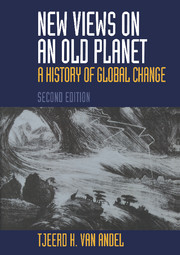Book contents
- Frontmatter
- Contents
- Preface
- Acknowledgments
- At the start
- Foundations
- Climate past and present: the Ice Age
- Drifting continents, rising mountains
- Changing oceans, changing climates
- The four-billion-year childhood
- 13 Birth of the solid earth
- 14 Water for the sea, air for the atmosphere
- 15 The dawn of life
- Life, time, and change
- Epilogue
- Glossary
- Sources of illustrations
- Index
15 - The dawn of life
Published online by Cambridge University Press: 05 June 2012
- Frontmatter
- Contents
- Preface
- Acknowledgments
- At the start
- Foundations
- Climate past and present: the Ice Age
- Drifting continents, rising mountains
- Changing oceans, changing climates
- The four-billion-year childhood
- 13 Birth of the solid earth
- 14 Water for the sea, air for the atmosphere
- 15 The dawn of life
- Life, time, and change
- Epilogue
- Glossary
- Sources of illustrations
- Index
Summary
The first steps in the evolution of life need not have involved life itself. Non-biological reactions may have produced organic compounds from which the living cells would later be assembled. This chemical evolution, if it ever happened, has left no trace in the geological record, and neither have the first hesitant steps of life itself. What happened in this critical phase is speculative and controversial, but that is no reason to shun the issue. The arguments depend as much on a definition of life as on the rules of chemistry, and on reasonable although subjective opinions regarding the environment of the early earth, its geochemical condition, and the available sources of energy.
After the chemical evolution there was life, and where one stops and the other begins depends on what is and what is not life. A definition, although of considerable interest, is not needed here, and I shall merely assume that “life” implies an orderly set of biochemical functions, and a reliable way to reproduce and pass on to the offspring the processes that allowed the parents to exist.
CHEMICAL EVOLUTION
Organisms use a wide range of biochemical compounds that do not require a living factory, although they are usually synthesized there. The right amounts of carbon dioxide, nitrogen, hydrogen, water and a few trace elements will, with application of suitable energy, produce many of the basic blocks in air or water.
- Type
- Chapter
- Information
- New Views on an Old Planet , pp. 292 - 310Publisher: Cambridge University PressPrint publication year: 1994

